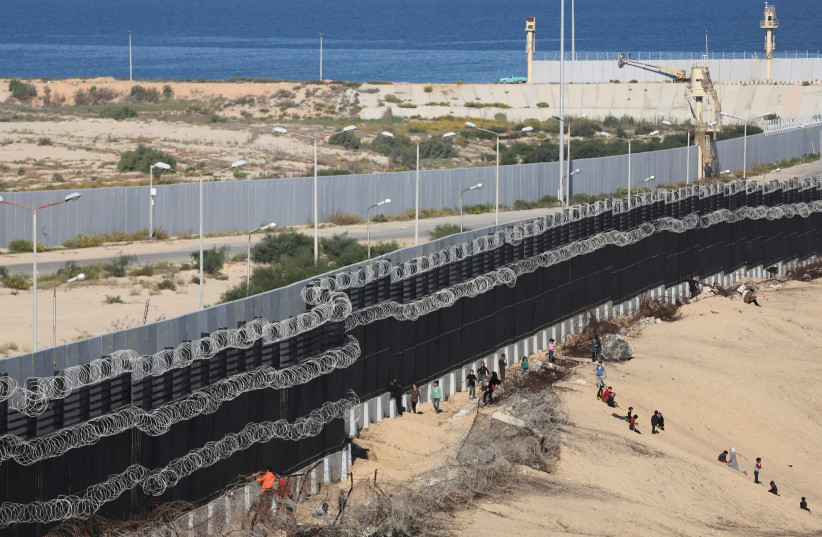IDF intelligence chief Maj.-Gen. Aharon Haliva and Shin Bet (Israel Security Agency) chief Ronen Bar visited Egypt on Monday to try to convince Cairo to work with Israel on the Rafah problem, The Jerusalem Post has learned.
While they made some progress, it was unclear if this would allow Israel to begin acting in Rafah in the coming weeks or if actual action was still a longer and undefined period of time away.
Until now, the IDF has held off from going after Hamas in Rafah, from cutting off the terror group’s cross-Egypt-Gaza border tunnels, and from starting to build a new obstacle on that border to make any invasion or smuggling more difficult.

It has also objected to any IDF moves that might undermine its sovereignty and is concerned about any IDF expansionist war moves prior to a clear understanding of when the IDF will leave Gaza and how the area will be managed after the IDF’s withdrawal.
Separately, IDF ground forces coordinated with Air Force fighter jets to destroy the rocket launchers, which were used to fire a barrage of rockets into the central Israel and Tel Aviv areas on Monday, as well as eliminating terrorist cells in various parts of the Gaza Strip.
On Tuesday, Hamas only managed to fire once and only on Nahal Oz.
The IDF also announced that its troops attacked a Hamas anti-tank missile unit.
In addition, soldiers from the 98th division continued fighting in western Khan Yunis.
The forces eliminated terrorists during combat and located large quantities of weapons.
IDF soldiers from the 162nd division operated against terrorists in the central and northern Gaza Strip as well.
In the northern Gaza Shati area, soldiers from the 401st brigade eliminated multiple terrorists and located vast amounts of weapons.
In the central Gaza Strip, soldiers from the Nahal brigade identified a terrorist cell armed with RPGs that was approaching troops in the area. With the direction of the fighters on the ground, a UAV targeted and killed the terrorists.
Also, IDF 4th Brigade soldiers used drones to obtain intelligence in real time and quickly eliminate terrorists. In one incident, the drone operators identified a terrorist squad that was moving towards them and, using the feed from the drone footage, directed an aircraft to successfully eliminate them.
<br>Gallant says Hezbollah could strike Haifa
Regarding the North, Defense Minister Yoav Gallant on Tuesday said that war with Hezbollah could be getting closer and that such a conflict could lead the terror group to seriously strike Haifa.
Gallant said that in light of the increasing likelihood of war in the North, Haifa needs to make more comprehensive preparations for being hit by large numbers of the terror group's rockets.
Hezbollah has 150,000 rockets and mortars and could fire potentially up to 8,000 rockets per day, several levels of magnitude greater than what Hamas was able to do other than for one day on October 7.
Its rockets are also more precise, long-range, and destructive,
Combining those factors together, defense officials believe that even if Iron Dome maintained an 80-90% shoot-down rate, enough rockets would get through the missile shield to do major damage to Haifa and some other cities.
Israeli defense officials still believe Israel would "win" such a war in the military sense and that unprecedented levels of air force strikes in Lebanon would degrade Hezbollah's rocket power within several days or a couple of weeks, but that the early period would harm the home front far more than Hamas, and that Hezbollah could manage rocket fire for longer than Hamas.
Meanwhile, the IDF said aircraft hit a Hezbollah command center and an observation post in the southern Lebanon village of Khiam.
Earlier Tuesday, the air force had attacked another observation post and building used by Hezbollah in Ayta ash-Shab and Mhaibib.
Hezbollah only managed to fire one rocket from Lebanon at the Arab al-Aramshe area, which landed in an open area without causing any injuries.
As a whole, the war has left around 1,300 combat positions vacant due to around 550 deaths and many injuries, which the IDF and the Defense Ministry have said must be filled soon to avoid the military falling to reduced levels of effectiveness.
The IDF said on Tuesday that it will draft 850 adolescents early who are currently in special military preparatory programs and another 450 early from Yeshivat Hesder programs which mix yeshiva study with military service.
The vacancies impact almost every major military unit, from Golani to Givati to other forces.
Also, multiple rounds of currently serving combat fighters who were supposed to be released this past December or this coming March have had their service extended.
Questioned about the open discrimination in which, even in wartime haredim are not being forcibly drafted in higher numbers to the IDF, while other sectors are being pressed to serve more and longer, the IDF had no specific answer.
Rather, the IDF relied on past pre-war policy regarding haredim as if little had changed in the country and in society, adding that the Haredi sector would be less ready to immediately contribute to fill the specific combat role vacancies.
While top defense officials have promised to press for greater equality in terms of Haredim finally serving in the IDF in higher numbers after so many IDF soldiers died defending the country in 2023, the government still has not taken any clear steps in that direction.
Jerusalem Post Staff contributed to this report.
